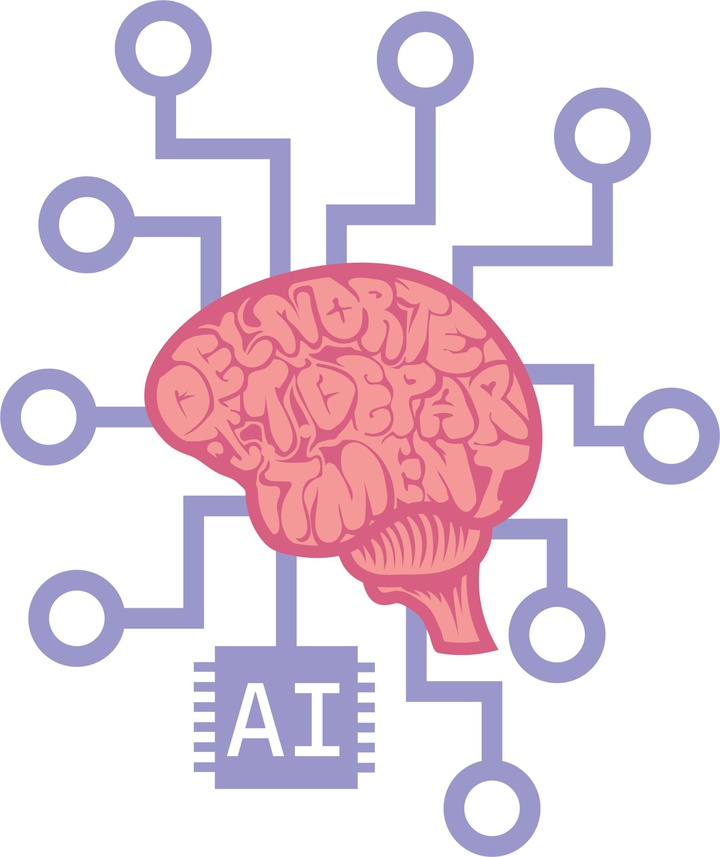Jessica Cejnar Andrews / Friday, Jan. 12, 2024 @ 3:20 p.m.
From Adaptive Learning Programs to Chat GPT, DNUSD to Develop Policies Surrounding AI in the Classroom

Del Norte County Office of Education's new AI logo.
Document:
• DNUSD AI in Education Presentation
###
Ryan Bahten used a Morgan Freeman deepfake and a ChatGPT link to illustrate the need for Del Norte Unified School District to develop policies around artificial intelligence.
Speaking before the Board of Trustees on Thursday, the Del Norte County Office of Education’s director of information network services said generative AI like ChatGPT presents challenges. Bahten referred to privacy concerns and ethical issues around whether such programs present reliable data, as well as deeper questions about whether AI will displace human interactions.
But AI can also be beneficial, Bahten said. The district already uses adaptive learning tools like Khan Academy, McGraw-Hill Connect and Duolingo. Students and teachers are paying the subscription fee to use Chat GPT. Plus, there are jobs in AI that pay six-figure salaries, Bahten noted.
“There are positions out there right now that we should probably be training our students to be prepared for,” he said. “How to write a good AI prompt.”
Bahten sits on the Technology Steering Committee for California County Superintendents and is part of a subgroup of IT directors creating AI-focused policy statewide. The goal is not to establish a broad ban, he said, but to develop a toolkit specific to DNUSD using input from teachers and the district’s curriculum and instruction and IT departments.
Bahten especially wants to tap into the experience of the technology’s “early adopters." This includes Andrew Hooper at Bess Maxwell Elementary School, who, Bahten said, is asking for access to Google Bard.
“We need to grab those people and try to use them to help build our capacity across the rest of the district,” Bahten said.
In addition to using AI for adaptive learning programs like McGraw-Hill, DNUSD uses the testing software iReady to create customized learning pathways for students. Other AI methods can be used to address the needs of students with special needs tailoring lessons specifically to them, which is something teachers can’t always do, Bahten said.
Bahten added he also sees AI being used to increase the amount of time teachers spend working with students. He noted that the average teacher in the United States works about 50 hours per week, spending about 49 percent of that time in front of students.
AI could take on some of the administrative tasks teachers spend 51 percent of their time on, Bahten said.
“That’s what I’ll be bringing back over the next few months — some policies and thoughts around how we can possibly leverage some of those things,” he said, adding that it may be possible to add another 5 or 10 percent to the amount of time teachers spend with students. “[Raising] 49 percent to maybe 60 percent is huge. It could be huge.”
Joking that AI comparable to the Force — it can be used for good or evil — DNUSD Superintendent Jeff Harris said Bahten’s presentation is part of a wider conversation around how the district invests in AI software and teaches students about AI.
“Most, if not all school boards, don’t have policies or regulations around AI, and they may not really understand what’s out there,” Harris told the Outpost. “I foresee this being a bit of a series.”
Bahten’s presentation led Board President Charlaine Mazzei questioning whether the district and society in general were teaching students how to be good consumers of information.
“Part of our policy needs to be around how we teach kids to ask deeper questions and not just accept the first thing they see,” she said. “That has to be embedded throughout what we teach.”
Trustee Michael Greer said he wanted to know what DNUSD teachers think before the policies are put into writing.
Bahten said he couldn’t develop these policies and toolkits by himself.
CLICK TO MANAGE